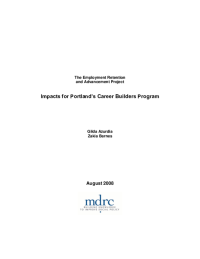Impacts for Portland's Career Builders Program
The Employment Retention and Advancement Project
This paper and accompanying tables present the implementation results and two-year impacts on employment, earnings, and public assistance receipt for the Career Builders program in Portland, Oregon. Using a team-based case management approach, Career Builders intended to remove employment barriers and assist with job placement and employment retention and advancement for a particular group: applicants and recipients of Temporary Assistance for Needy Families (TANF) who had a break in employment or received TANF in the two years prior to study entry. The program was run from two district offices of the Oregon Department of Human Services (“North” and “East” offices) in collaboration with two community colleges (Mount Hood Community College [MHCC] and Portland Community College [PCC]).
Key Findings
Career Builders was faced with many challenges that prevented it from being implemented as intended. Due to lack of funds and support from administrators and some staff, key features of the program model — in particular, the provision of postemployment services — were not implemented. As a result, the Career Builders program provided services very similar to those of the regular TANF program. Given that the program was not implemented as intended, the Oregon Department of Human Services (DHS), the U.S. Department of Health and Human Services (HHS), and MDRC jointly decided that the study of Career Builders would not provide a fair test of the program model that DHS attempted to implement. Therefore, the study ended only nine months after random assignment began. Not surprisingly, the impact results show that the program did not have any effects on employment, earnings, or receipt of public assistance.
The evaluation of Career Builders is part of the Employment Retention and Advancement (ERA) project, an evaluation of 16 innovative models in eight states. ERA is a rigorous, long-term, multisite evaluation of program approaches that are designed to help current or former TANF recipients or other low-income families retain and advance in employment. The ERA evaluation was conceived and funded by the Administration for Children and Families (ACF) in the U.S. Department of Health and Human Services, and supplemental support has been provided by the U.S. Department of Labor. (Appendix Table A.1 describes the 16 ERA models and their sites, target groups, and service strategies.)






